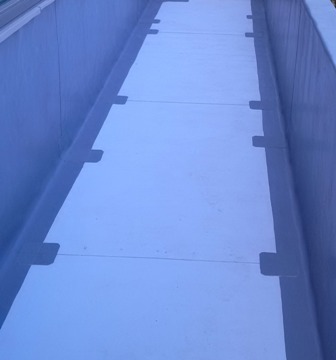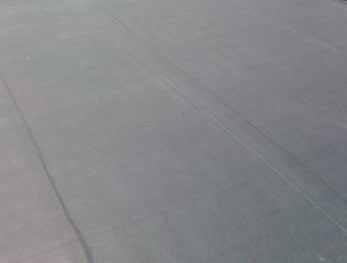
What Is Single Ply Roofing?
Single-ply membranes are factory-manufactured sheet membranes. They generally are categorized as either thermoplastic or thermoset. Thermoplastic materials can be repeatedly softened when heated and hardened when cooled. Thermoset materials solidify, or "set," irreversibly after heating. Single ply membranes commonly are referred to by their chemical acronyms, such as:
.
- Thermoplastic Polyolefin or TPO
- Polyvinyl Chloride or PVC
- Ethylene Propylene Diene Monomer or EPDM

Benefits
- Reliable
- Cost effective
- Energy efficient, UV resistant, lowers heating and cooling bills
- Extremely strong seams
- Fire resistant
- Resistant to chemicals, acid, salt, oil etc.
- Strong puncture resistant material
- Most environmentally friendly single ply system
- Great flexibility even at extremely low temperatures
- Light weight, available in multiple colors

Benefits
- Reliable
- Cost effective
- Energy efficient, UV resistant, lowers heating and cooling bills
- Extremely strong seams
- Fire resistant
- Resistant to chemicals, acid, salt, oil etc.
- Strong puncture resistant material
- Most environmentally friendly single ply system
- Great flexibility even at extremely low temperatures
- Light weight, available in multiple colors
- Strong, puncture-resistant material
- Superior resistance to chemicals, chemical fumes, greases, acids, oils and many kind of fuels.

EPDM
EPDM (Ethyline Propolyne Diene Terpolymer) is a single-ply rubber roofing membrane that is resistant to a high degree of ozone, ultraviolet, weathering, and abrasion damage. Because of its tolerance to a wide array of weather conditions and superb second generation application, EPDM is one of the most sustainable and environmental materials currently used in the industry. Three application methods (ballasted, fully adhered, and mechanically attached) are available for EPDM.
- Accounting for 35% of current EPDM installations, ballasted systems provide the most cost-effectiveness due to the ease and speed of installation. These systems are primarily used for large new construction projects, but can also be used on roof replacement projects on buildings that can accommodate an average ballast weight of 10-12psf.
- Mechanically attached systems are a lightweight solution for building of all sizes in which the roof membrane is affixed to the structural deck using mechanical anchors.
- In applications where the use of mechanical fasteners is undesirable or unfeasible, fully adhered applications affix the roof membrane directly to the insulation board or other roofing substrate. Because of recent technological advances, the fully adhered system is quickly becoming a leading choice in second generation applications and is ideal for use in special configurations such as domes and barrels.
.
To get an estimate for your project or more information in regards to your roofing needs, please feel free to call us or submit the estimate form.
.
☎ 647-866-5964